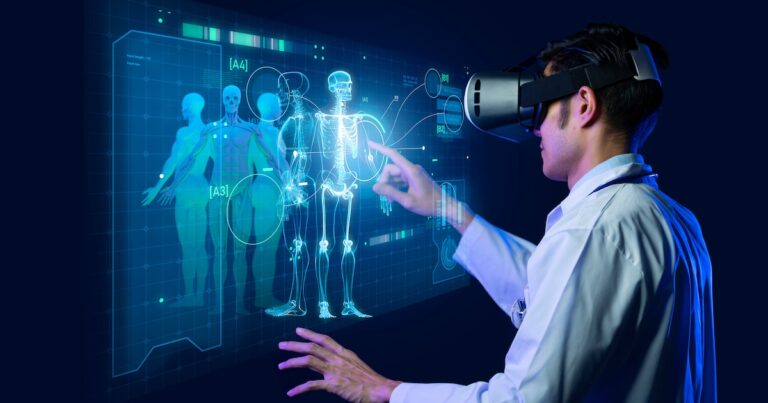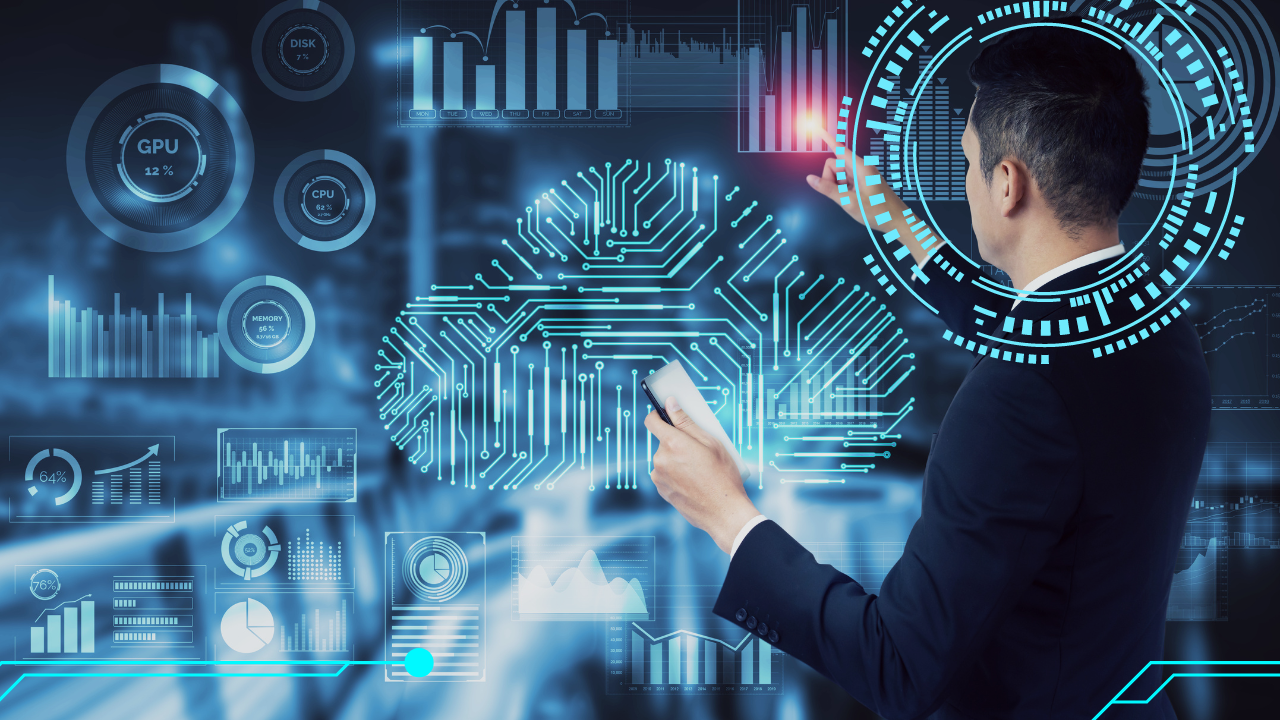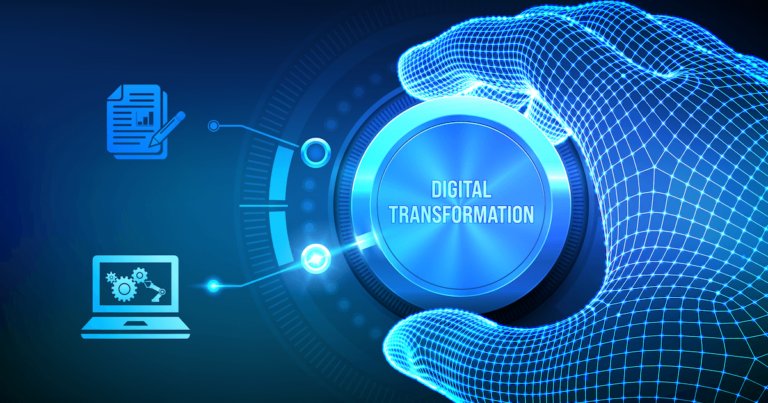Leonard D’Avolio, Ph.D., founder and CEO of Cyft – a company helping organizations use technology to adjust their workflow and system to reduce cost and improve outcomes – sees artificial intelligence not as a solution but as a capability. He also said, “change in healthcare is hard, but change is also a prerequisite for improvement”. That picture gets pretty clear when we look at the market size of artificial intelligence in healthcare.
According to Markets and Markets, “The global Artificial Intelligence in healthcare market is projected to grow from $13.82 billion in 2022 to $164.10 billion by 2029, at a CAGR of 42.4%.”
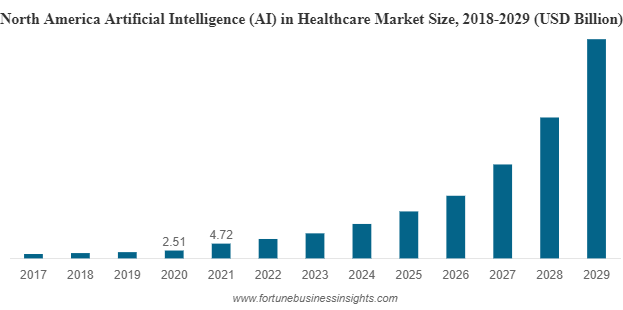
Both private and government enterprises have made significant investments that led to the expansion of AI in the healthcare industry. In the upcoming time, we could expect advancements in the field of diagnosing, treatment planning, population health management, decreasing the administrative burden, personalized care delivery, increasing the accuracy and prediction for disease treatment and prevention, and others. AI in healthcare helps the industry achieve the ever-required need for speed, accuracy, and efficiency. AI, with machine learning, natural language processing, context-aware computing, and computer vision, can benefit the industry immensely. Let’s understand how the development of artificial intelligence has benefits for the healthcare industry.
1. Patient Data and Risk Analytics
Everything begins with people. In healthcare, both a patient and a provider are at the forefront of any healthcare organization exchanging health information to identify the best health support. Not every time a patient explains the complete healthcare situation and not every time a healthcare professional anticipates the intricacy of every piece of information for planning the best care or diagnosis for the patient. AI helps here by promoting and establishing processes or practice mechanisms focused on increasing service centricity.
AI can be used in healthcare workflows such as outpatient management, appointment management, approvals, consultations, admissions, billing, claims, etc. It will provide a more personalized support to a patient and their family as they can avoid long queue wait times for appointment checks, availability, etc., can directly come up to the clinical premise at the scheduled time, get tested, and leave. Even enabling a conversational bot powered with AI can help a patient identify the initial symptoms like flu or cold, and refer them to the best specialist for further assistance.
Since all information is collected, stored, and processed through connected intersystems and encryption, a patient doesn’t need to carry unnecessary medical records or prescriptions. Even a healthcare professional can look up the patient’s history digitally through the computer or tablet before the patient’s appointments and can further discuss the reports with other experts to decide the best treatment.
2. Medical Imaging And Diagnostics
Radiology is encountering numerous difficulties such as a scarcity of radiologists on a global scale, a growing population, and an escalating need for imaging and diagnostic services. These factors collectively diminish the amount of time that radiologists have to assess an individual scan. This pressure has been shown to significantly and negatively influence the well-being of radiologists, pushing many to burnout, and consequently reducing the department’s productivity and quality of medical care given to patients. And top of it, medical diagnosis errors affect the health of millions of Americans and cost billions of dollars.
The use of artificial intelligence (AI) might be one of the solutions to relieve the radiologists’ workload. Machine learning technologies along with deep learning, reinforcement learning, and others can help identify hidden or complex patterns in diagnostic data to detect diseases earlier and improve treatments.
The implementation of artificial intelligence in diagnostic and interventional radiology could help improve image analysis, aid in the diagnosis, as well as suggest appropriate interventions, clinical predictive modeling, and trainee education.
Particularly, recent deep learning-based methods for image reconstruction have significantly contributed to methodology designs and performances in handling volumetric imaging data.
Through this advancement, AI can be used to see anatomical structures, organs, and biological processes unreachable by unaided eyes, providing tremendous opportunities for scientific research as well as disease diagnosis and treatment. Different modalities such as magnetic resonance imaging (MRI), computational tomography (CT), and positron emission tomography (PET) can provide versatile information, ranging from structure, and morphology to physiological function.
3. Precision Medicine
There are many mobile applications in the market like FitBit supporting health and wellness by providing its users suggestions for better lifestyle activities by tracking their heart rate, eating habits, environmental conditions, etc. There are even applications suggested by doctors to patients so that they can continuously get data from the patient to improve their health behaviors and outcomes.
These applications are the example of ‘Precision Medicine’ which is an emerging field in therapeutics. Precision medicine helps develop an understanding of the genetic makeup, personal lifestyle, gene, and surrounding environment of an individual. Healthcare providers use the application and the data to customize prevention and treatment strategies for an individual by identifying the factors that predispose this individual to a specific disease and defining the underlying molecular mechanisms that induce the disorder.
Since wearable sensors are generating a large amount of data, these applications require new digital approaches and resources for analyzing, integrating, and interpreting the massive amount of data.
Here AI Algorithm helps organizations to capitalize on precision medicine in several ways. It helps deepen the knowledge of the origins and course of chronic diseases. In precision medicine, an AI-powered algorithm is a great help since it will help analyze lifestyle factors and biological factors – genetics, epigenetics, and the microbiome to the development and progression of chronic inflammation. Henceforth, ML/AI algorithms will help develop personalized medications for better management and prevent chronic diseases.
4. Drug Discovery
According to Morgan Stanley, biotech with AI will create a $50 billion market over the next decade. Biotech companies are applying AI and machine learning to drug development, potentially creating a transformative experience for both medical providers and patients suffering from hard-to-treat diseases.
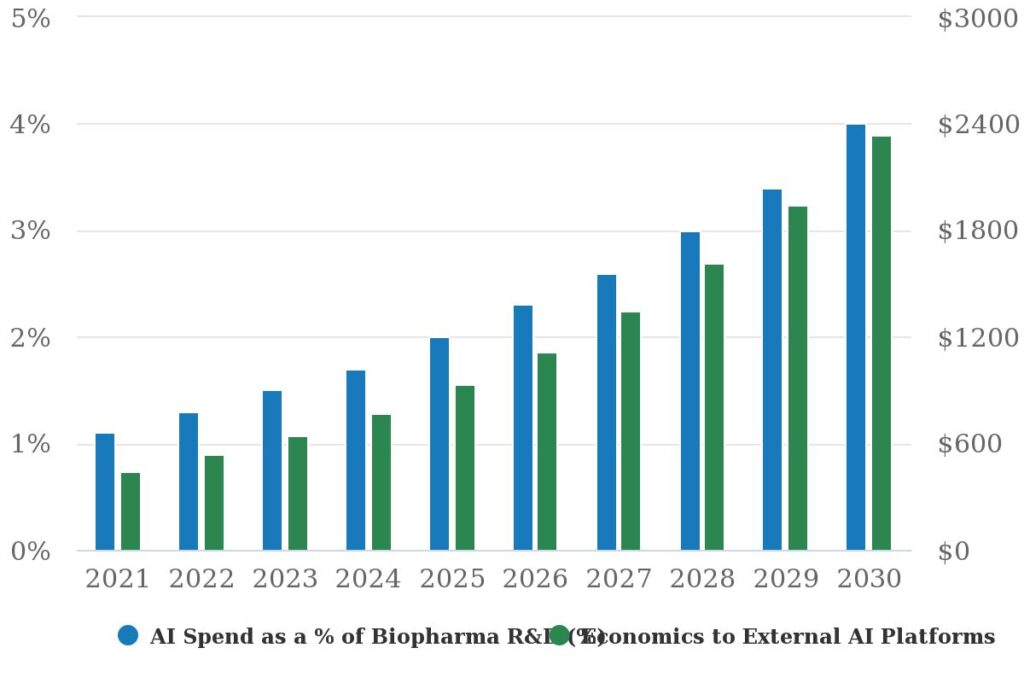
The impact of AI in biotech is huge right from most improvements in early-stage drug development success rates to delivering sizable cost savings from payors as AI enables earlier identification and treatment of higher-risk patients. AI-enabled drug discovery addresses many challenges and constraints in traditional R&D; henceforth can deliver value by promoting better success rates, and quicker and cheaper discovery processes.
5. Lifestyle Management & Monitoring
With AI-enabled lifestyle management apps and robots, patients can be monitored on a continuous basis in the absence of nurses and physicians. There are many applications doing the job in real-time such as AICure which uses the smartphone’s front camera and keeps a check on patient behavior in real time. AI has already empowered facial and medical recognition capabilities and when these are merged with lifestyle and monitoring applications, it improved the efficacy of medicine ingestion. Hence, ensuring the patients are adhering to their prescriptions.
6. Emergency Room & Surgery
AI has gained significant adoption in surgical robotics and this new technology holds impressive promise. Robot-assisted surgery supports surgeons and allows them to perform with greater control and flexibility, thus reducing errors. These surgical robots are trained on actual surgical experiences based on medical records to improve the techniques for better surgical outcomes.
Emergency support has become an ongoing challenge causing delays in treatment. AI assistance can help predict ER visits to ensure necessary care. There are other use cases as well of AI-enabled robotics in healthcare. Besides robotics surgeries, these robotics can be used with streamlining supply change delivery and disinfection and help providers give more direct attention to patients.
7. Cybersecurity
Artificial intelligence has matured in the last few years and it can detect the difference between normal activity on the network and the work of a malicious hacker. Since healthcare information is highly sensitive and now these are being transferred and stored through electronic means or the internet or applications, responsible implementation of security and privacy is highly required in healthcare. Although AI possesses the potential to unlock significant medical breakthroughs, it is also a very targeted thing among cyber criminals. Experts are also using AI in protecting the very systems with AI which power these healthcare advances. AI is helping to detect, neutralize, and defend against cybersecurity in the medical environment.
Current AI Situation And The Way Ahead In Healthcare Solutions
The current situation of artificial intelligence (AI) in healthcare solutions is promising. AI is being used to support healthcare professionals in diagnosing and treating patients, identifying patterns in large amounts of data, and improving patient outcomes.
Machine learning algorithms are being developed to analyze medical images, detect diseases, and predict patient outcomes. Natural language processing is also being used to extract valuable insights from electronic health records, enabling more accurate diagnoses and better patient care.
Moving forward, AI has the potential to transform healthcare delivery by providing personalized care, improving efficiency, and reducing costs. However, there are also concerns about the ethical implications of AI, such as data privacy and bias, that must be addressed in order to ensure that AI is used in a responsible and effective manner in the healthcare industry.
